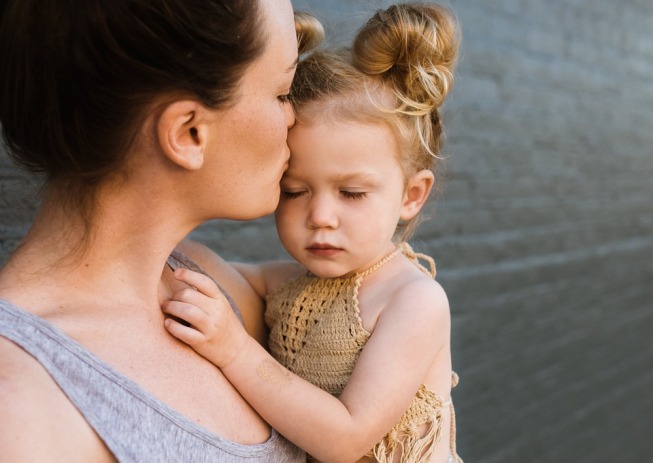
For me, parenting has been a constant evolution of epiphanies, with a cliff-steep learning curve.
Early parenting was particularly brutal for me—partly because parenting is challenging, and partly because of how I’m wired.
If I could start my parenting journey all over again, knowing what I know now, here’s what I’d do differently to cause myself less suffering:
Ask for more help. Without even realizing it, I bought into the cultural cognition that as a mother, I should be able to “do it all.” Add to that belief that I’m a highly sensitive, empathic, and stubborn person who struggles to accept help—even when it’s handed to me on a glistening platter—and I was sunk. If I could get a redo on the early years of parenting, I’d ask for much more help from my husband, my parents, and the good folks at the gym daycare. I’d understand that my kids deserve a mom who takes excellent care of her body, mind, and spirit, not one who thinks she has to give up her self-care and passions because she’s now a mom.
Stop trying to fix your kid. My son was a colicky, unhappy baby. To try and “fix” him, I spent hours upon hours Googling about allergies to breast milk, I went on a crazy elimination diet that left me dizzy and gaunt, I spent money on colic tinctures, homeopaths, osteopaths, and sleep consultations, and I even hauled in a poopy diaper for my son’s pediatrician to examine. (I’m sorry, Dr. T.) I was a new mom, struggling with postpartum depression and sleep deprivation, trying desperately to fix my son. As it turns out, he wasn’t broken. Like me, my son has a sensitive nervous system, and none of my obsessing could’ve changed that—it just made me feel crazy, and it cost a lot of money.
Ease up on the whole “attachment parenting” thing. As a crunchy, perfectionistic, empathic soul, attachment parenting—which promotes, among other things, breastfeeding, baby-wearing, and co-sleeping—spoke to me. But what I heard it saying was, “Meet your baby’s every need, and ignore your own.” I don’t think this is the message that attachment parenting proponents intend to promote, but it’s the one I picked up. Over time, I realized that I was naturally deeply attached to each of my kids. I didn’t need to adhere to every facet of a parenting style to ensure that, and criticizing myself when I veered away from some attachment parenting principles caused me a lot of anguish.
Make my own emotional regulation a priority. This is a huge for me. Trying to stay calm while tiny humans cry for hours or toss tantrums around like discarded socks is exhausting, and, at least for me, impossible. Until I became a parent, I thought I was a patient person. As it turns out, a steady stream of poopsplosions, tattered sleep, and tantrums can wear down even those with saint-like patience. If I could rewind, I’d go back and create a meditation practice for my postpartum self. I’d slather myself in lavender oil and get to yoga classes on the regular—without guilt.
Stop taking on my children’s emotions. I get easily overwhelmed by my children’s unpleasant emotions. I used to take each fall and tantrum so seriously, so personally, that I was actually experiencing my kids’ emotions with them. Which is, to say the least, exhausting and unproductive. As parents, we’re wired to be attuned to our kid’s emotions. There’s a reason the sound of our crying baby bothers us—it’s nature’s way of ensuring that we take care of our babies instead of feeding them to the dingoes. But it took me a long time to realize that, as a responsive parent, I wasn’t actually helping any of us by taking on my kids’ feelings. In fact, I was probably making things worse by reacting—upset kids do best when their parents remain calm and steady, at least on the outside.
Changing this pattern is uncomfortable. I’m so used to responding to my kids in an empathic way that trying to keep a worried look off my face when my daughter bumps into a chair, or modulating my own voice when my son raises his, feels strangely detached.
It’s hard to remember my children are separate people from me, having their own unique experience. But it’s the truth, and when I can remember that and respond accordingly, I’m actually a better mom.
I can’t go back and repeat the early years of parenting—thank goodness. My kids are in elementary school now, but it turns out it’s not too late to apply these lessons. I’ll be working on things like learning to ask for help, accepting that my kids are on their own paths, and improving my emotional regulation for the duration.
~~~~
Relephant:
~
~
Author: Lynn Shattuck
Image: Pixabay
Editor: Catherine Monkman
Copy Editor: Yoli Ramazzina
Social Editor: Yoli Ramazzina


 Share on bsky
Share on bsky




Read 65 comments and reply